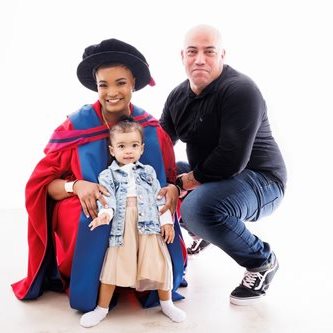 Prior to pursuing a PhD in Business Management, Dr Kinsman completed four other qualifications at Nelson Mandela University. She completed BCom Financial Planning in 2012, BCom Honours (Business Management) in 2013, MCom Business Management (cum laude) in 2014 and the PGDip Financial Planning in 2015. Dr Kinsman's PhD study commenced in 2019, and she completed it at the end of 2023. She took a sabbatical for two years, from 2021 until 2023, which was funded by the NRF Black Academic Advancement Programme (BAAP).
Prior to pursuing a PhD in Business Management, Dr Kinsman completed four other qualifications at Nelson Mandela University. She completed BCom Financial Planning in 2012, BCom Honours (Business Management) in 2013, MCom Business Management (cum laude) in 2014 and the PGDip Financial Planning in 2015. Dr Kinsman's PhD study commenced in 2019, and she completed it at the end of 2023. She took a sabbatical for two years, from 2021 until 2023, which was funded by the NRF Black Academic Advancement Programme (BAAP).
The idea of financial planning, its importance, and the benefits it offers appealed to Dr Kinsman as a student, particularly because it is something that people of colour are not familiar with or exposed to due to their cultural upbringing and the history of apartheid. In the past, people of colour were excluded from participating in the formal financial services industry. Stigmas and taboos surrounding finances still persist, leading to Black consumers (Black African, Coloured, Asian, and Indian) being hesitant to discuss their finances within their households and even less so with a financial planning professional. This hesitancy also translates into a reluctance to save, invest, insure, and make long-term financial plans. Dr. Kinsman viewed pursuing a career in financial planning as a means of empowering people of colour. As a financial planning academic, she aimed to have an influence on the type of financial planners they trained, ensuring that they were capable of providing inclusive financial advice to all South African consumers, regardless of their cultural background.
The title of Dr Kinsman's study was "A reconceptualised perspective of the six-step financial planning process." The six-step financial planning process is a globally applied framework utilised by Certified Financial Planner® professionals to offer financial planning advice. Dr Kinsman's study aimed to contextualise this process within the South African context, recognising the diverse cultural backgrounds of individuals in the country, which often give rise to unique financial planning requirements. To achieve this, she conducted interviews with decision-makers representing various cultural backgrounds, including those of Black African, Coloured, Indian, and Asian descent, along with CFP® professionals.
Dr. Kinsman's study presented a range of findings that contributed to the field of financial planning on theoretical, empirical, and practical levels. The study introduced a six-step financial planning process that incorporated elements specifically tailored to individuals from diverse cultural backgrounds, offering a unique perspective. The findings of the study were particularly insightful. Notably, despite the assumption that individuals of the same cultural background may have a stronger inclination to seek advice from individuals who share their cultural identity, it was discovered that most Black consumers do not prefer receiving financial advice from Black financial planners. This preference stems from the perception that White financial planners possess greater knowledge regarding wealth accumulation and transfer. Additionally, Black consumers sought guidance on managing the concept of Black tax and tended to prefer an objective opinion from a White financial planner, perceiving it as less biased than that of a Black financial planner.
The study also revealed the prevalence of misconceptions and fears surrounding finances among Black consumers, largely due to historical factors. Previous generations considered discussions about money impolite and contrary to their values, perpetuating misconceptions about estate planning, wills, and insurance. Of particular significance was the misconceptions surrounding the succession of family homes, which holds great importance within Black households. Overall, these findings shed light on the complex dynamics surrounding financial advice-seeking behaviours and highlight the need for a more inclusive and culturally sensitive approach within the financial planning profession.
During her sabbatical, Dr Kinsman, despite being relieved of her teaching responsibilities, continued to supervise honours and masters students. Throughout her PhD studies, she successfully supervised 9 honours students and 2 masters students. One notable individual she supervised was her colleague, Ms. Vuyolwethu Nyati, who pursued her MCom Business Management degree and graduated alongside Dr. Kinsman.
 Dr. Kinsman's most significant commitment during her studies was being a mother to her 18-month-old daughter. Despite the absence of a nanny, she took care of her daughter throughout her PhD studies. This responsibility posed challenges, but with the support of her husband and family, her daughter became her primary source of motivation and inspiration.
Dr. Kinsman's most significant commitment during her studies was being a mother to her 18-month-old daughter. Despite the absence of a nanny, she took care of her daughter throughout her PhD studies. This responsibility posed challenges, but with the support of her husband and family, her daughter became her primary source of motivation and inspiration.
Overcoming imposter syndrome and trusting one's abilities can be one of the most challenging aspects of undertaking a PhD, and Dr Kinsman experienced this first-hand. Fortunately, she was able to draw on her previous experiences in supervising and publishing, which provided her with confidence in her knowledge and research skills. However, there were numerous instances where starting a new chapter or making revisions proved to be incredibly difficult due to overwhelming feelings of doubt and anxiety, making her contemplate giving up. Trusting her abilities became a struggle, as there was a sense of expectation that she should already possess certain skills or have comprehensive knowledge of financial planning simply because she was an academic in the field. This overwhelming feeling at times became almost paralyzing.
Throughout her journey, Dr Kinsman encountered multiple breakdowns. However, her husband played a pivotal role in supporting her. With 15 years of unwavering faith in her abilities, he helped turn those breakdowns into breakthroughs. His constant belief in her became a source of strength and encouragement, allowing her to persevere and overcome the challenges she faced during her PhD studies.
 Dr Kinsman emphasizes the significant role her supervisors, Prof Chantal Rootman and Dr Xolile Antoni, played in her PhD studies. Their understanding of her and her passion for financial planning was invaluable in helping her shape her study into an exceptional thesis. The trust they placed in her abilities was empowering and brought out the best in her. Both supervisors possessed extensive knowledge and expertise as researchers, and Dr Kinsman acknowledges that she learned a great deal about herself, research, and supervision through their guidance.
Dr Kinsman emphasizes the significant role her supervisors, Prof Chantal Rootman and Dr Xolile Antoni, played in her PhD studies. Their understanding of her and her passion for financial planning was invaluable in helping her shape her study into an exceptional thesis. The trust they placed in her abilities was empowering and brought out the best in her. Both supervisors possessed extensive knowledge and expertise as researchers, and Dr Kinsman acknowledges that she learned a great deal about herself, research, and supervision through their guidance.
Despite being a supervisor and colleague herself, Dr Kinsman easily transitioned into the role of a student and scholar of financial planning under their mentorship. In addition to research skills and abilities, her supervisors imparted important lessons. Dr Antoni taught her to be brave and encouraged her to challenge the status quo in research. Prof. Rootman, on the other hand, showed her how to balance the demanding academic environment with being a present mother. The support, expertise, and mentoring provided by Prof. Rootman and Dr Antoni were instrumental in Dr Kinsman's journey, enabling her to thrive and excel in her PhD studies.
Dr Kinsman raises an important point about the societal expectations placed on women, particularly female academics, to make choices between their career, marriage, and motherhood. Often, there is a belief that one aspect must take precedence over the others because balancing all three successfully seems challenging. This expectation became evident to Dr Kinsman when people questioned how she managed to pursue her PhD while simultaneously caring for her daughter full-time.
She hopes to be an example that challenges this narrative and proves that women don't have to choose between these roles. While acknowledging that it may not be easy, she believes it is entirely possible to excel in all areas of life with the right support system and people in one's circle. Her personal experience demonstrates that being a successful career woman, wife, and mother can coexist harmoniously, dispelling the notion that women must sacrifice one aspect for the sake of the others.
By sharing her own journey, Dr Kinsman aims to inspire and empower other women to pursue their goals and aspirations without compromising any important aspect of their lives. She advocates for a more inclusive and supportive environment that recognises and values the multifaceted roles women play in academia and beyond.
Photography by: Laetitia Bosch Photography